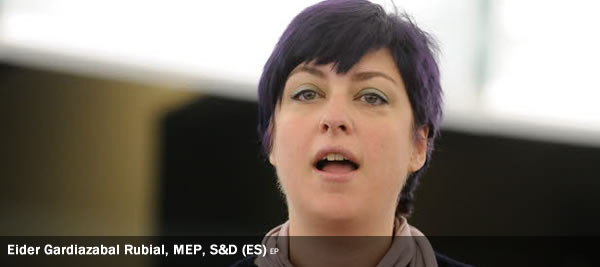The Council’s version of the draft EU budget for 2015 disregards its own political pledge to spur economic growth and job creation, MEPs said after Council Presidency representative Enrico Zanetti presented it in plenary session on Tuesday.
EU member states propose a budget of €145.077 billion in commitments and €139.966 billion in payments, i.e. cuts of €552,000 in commitments and €2.1 billion in payments compared to the Commission’s original proposal.
The Council’s deepest cuts target programmes to enhance Europe’s competitiveness and stimulate growth and job creation. It reduced funding for large infrastructure projects and research by €1.3 billion, which will make it hard to get some projects off the ground.
ˮWe want Europe to get out of its crisis and become competitive by developing a knowledge-based economy. For that, it is essential to reinforce research and development as well as education programmesˮ, said Eider Gardiazábal Rubial (S&D, ES), the MEP in charge of the draft budget for 2015.
The Council cut the payments budget available for the EU’s external policy by 5.2% (€378 million) and in particular funds for tackling crises like those in Syria and Palestine and helping out neighbours in dire straits, such as Ukraine. Ministers also cut the budget for the LIFE environment protection programme by €16.9 million). The only areas left virtually untouched by the member states are agriculture and structural (regional development) funds.
Horizon 2020
Horizon 2020, the EU’s largest innovation and research programme, bore the brunt of the Council’s cuts for 2015, despite its recent pledge to invest in the economies of the future.
Ministers cut funding for new contracts by €190 million and despite difficulties already encountered this year in paying bills for existing Horizon 2020 projects, also reduced funding for payments by €981 million in 2015. These difficulties affect about 600 collaborative projects involving 7,000 participants of which 1,400 are small or medium-sized enterprises, noted research Commissioner Máire Georghean-Quinn in a separate debate on Horizon 2020.
As in previous years, there are insufficient resources in the payments budget to settle invoices due this year, which is an irresponsible way of budgetingˮ, stressed Budgets Committee chair Jean Arthuis (ALDE, FR).
The EU’s current long-run budget (2014-2020) started with a massive backlog of payments amounting to €23.4 billion in regional spending bills alone. As these bills are being paid out of the 2014 annual budget, the Commission had to ask for an additional €4.7 billion to plug the resulting gaps. There is not enough money to pay for commitments in external policies, Horizon 2020, Erasmus+ for students and COSME for small and medium sized enterprises.
Following the presentation of Council’s position, the Parliament has 42 days to vote on its own stance. Amendments to the Council figures will be voted in Parliament’s Budgets Committee on 29 September and plenary session on 22 October. Parliament’s final vote on a Council/Parliament common position on next year’s budget is scheduled for 26 November after conciliation.
